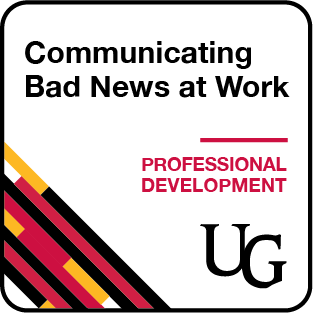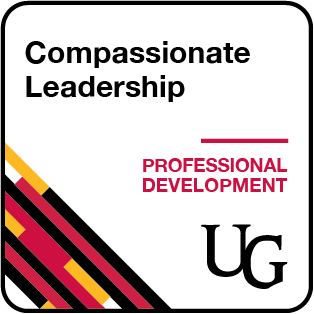
Under the theme of “Improve Work,” the University of Guelph will host two online professional development programs in August to foster compassionate leadership and improve communication during challenging times in the workplace.
The sessions, to be delivered virtually over two half-days, are designed for professional and organizational leaders both within and outside the University, and are led by U of G industry and research experts.
Participants will gain knowledge and skills from emerging industry trends and research in neuroscience, positive psychology and human resources management. They will learn strategies to incorporate into their everyday work and can receive a digital badge upon completion of a skills-based assessment after completing either session.
“Strong leadership skills are critical for building a sense of community and promoting creativity and productivity in any organization,” said Dr. Brian Husband, associate dean, academic, in the College of Biological Science and a member of the program working group.
“The pandemic has only heightened our awareness of this, as provincial health restrictions have instigated rapid change and stress in our workplace environments. The lightening of restrictions may have a similar effect. We expect the timing of our programs on compassionate leadership and communicating bad news at work will be particularly timely.”
 “Communicating Bad News at Work, and Doing It Well” will run Aug. 11-12.
“Communicating Bad News at Work, and Doing It Well” will run Aug. 11-12.
Delivering bad news effectively—poor performance reviews, dismissals, workforce reductions, reorganization or non-selection for promotions— can be difficult, according to research, and little development or training in evidence-based practices exists to help communicators and leaders. Using practical topics and activities, this session will train participants to frame, manage and deliver bad news as well as post-delivery management.
This session will be taught by Dr. Nita Chhinzer, a professor in U of G’s Gordon S. Lang School of Business and Economics. She is an award-winning researcher and workforce management expert.
“Organizational leaders and managers are rarely trained on the science of delivering bad news,” said Chhinzer. “This session aims to do so by providing training, experiential learning and exercises around how to effectively communicate negative events and decisions.”
 “Compassionate Leadership: Why It Matters Now More Than Ever” will run Aug. 18-19.
“Compassionate Leadership: Why It Matters Now More Than Ever” will run Aug. 18-19.
Drawing from current research, this session will provide skills and strategies to help learners practise compassionate leadership.
Leaders constantly influence the work environment and workplace culture through their actions and reactions, often without recognizing their impact.
A compassionate leader focuses on connection and support, building trust, enabling creativity and productivity in the workplace, said session leader Linda Watt, director of learning, development and consulting services in U of G’s Department of Human Resources.
The session will explore the importance of self-care in caring for others and considering impacts of behaviour on others. One strategy will help create awareness of emotional triggers and patterns of judgment and how to create a “strategy of generosity” in the workplace.
“The COVID-19 pandemic has placed huge pressure on many employees’ ability to manage work and home life,” said Watt, who is a leader in progressive culture change, enlightened leadership practice and organizational effectiveness.
“It has required constant adaptation to continuously changing and challenging circumstances that impact people’s health and wellness. In this time of societal and organizational recovery, leaders can best demonstrate the value the organization puts on the wellness and happiness of their people through compassion.”
The sessions will help current or aspiring leaders, Husband said.
The University is partnering with the Human Resources Professional Association (HRPA) to deliver the programs. Nadia Timperio, manager, graduate curriculum, in U of G’s Office of Graduate Studies, said the association provides its 24,000 members with timely professional development and learning opportunities for HR professionals.
“By partnering with HRPA, the University has the opportunity to share expert insights and inspire positive change across countless workplaces within Ontario that might otherwise be beyond our sphere of influence,” Timperio said.
Natalie Green, associate director, distance and continuing education, in Open Learning and Educational Support at U of G, said the digital badges available following the sessions allow professionals to showcase and share their skills through LinkedIn and other social media outlets.
“The metadata associated with the badge makes them a powerful tool for communicating personal skill achievement to both current or prospective employers and can serve to demonstrate an individual’s commitment to continuous learning, highlighting achievements that may otherwise go unacknowledged,” Green said.
The courses are available to everyone. University of Guelph alumni and HRPA members may register for the sessions at a discounted rate.